Slow-Cooked Dog Foods
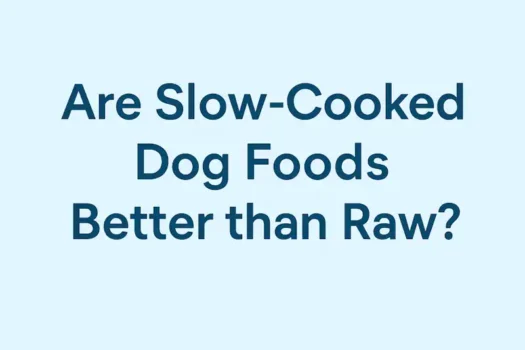
There are benefits to feeding a slow-cooked dog food instead of kibble, but also instead of raw.
If your dog has to-date been fed a kibble diet, or even kibble and canned, then you may find they don’t take to raw. Some dogs in this situation even throw up when fed raw, and this can make matters worse as they associate the sickness to the raw food (this is an aversion to raw).
In Australia we have some excellent slow-cooked dog foods – the highly rated Lyka, the ever popular Prime 100 SPD Slow Cooked dog food, as well as The Nosh Project, and more budget-friendly Nature’s Gift Slow-Cooked.
If you want to go the fresh/homemade route, then slow-cooking your dog’s food is also an option (which you can bag up and freeze for convenience).
Firstly, let’s take a look at why a slow-cooked dog food may work best for your dog…
Why would you feed a slow-cooked dog food?
There are a few reasons why a slow-cooked dog food would work better for your dog than kibble, wet, or raw.
Let’s take a look…
Better nutrient retention than kibble
Let’s say kibble has the least nutrition based simply on high temp cooking methods (and often poor ingredients), and raw should offer your dog the best and most natural nutrition.
Kibble actually addresses this issue by dusting on vitamins and minerals after the main nuggets of kibble have been baked (extruded).
When you consider slow-cooked (low-temperature cooking) is closer to raw than kibble (very high temps, cooked twice for meat meals etc), then that’s definitely a step up if you current feed your dog kibble.
Better for your dog’s gut health than kibble (and gut health is so important!)
Scientifically it’s been shown kibble-fed dogs have a less-diverse gut microbiome, and this is likely the reason a transition to full raw can cause issues. To explain that in simple terms, it means the dog has a weaker digestive system, and even if you don’t plan to transition your dog to full raw this is definitely something worth fixing.
Many health problems start in the gut, so you want your dog’s gut health to be strong and balanced.
This means a transition (or partial transition) from either dry or wet canned food to slow-cooked dog food is a great idea.
More enjoyable, and more natural for your dog
It’s much easier for your dog to digest a slow-cooked food than a kibble. A veterinarian friend of mine has witnessed dogs in care vomiting still-hard nuggets of kibble over 24 hours after eating it, which really highlights the poor digestibility of some kibble brands (this was one made mostly of cereal grains).
Slow-cooked food tends to be more palatable than dry dog food, which means your dog will likely enjoy it more.
Your dog may enjoy a slow-cooked dog food more than raw food, as cooking can enhanced flavours.
That means, if your fussy dog turns his nose up at kibble (possibly for good reason), then a slow-cooked dog food can be a great solution.
Better for allergies and sensitivities
We’re often of the belief our dogs have “an allergy” to a food or type of food, which is often caused by a weak gut microbiome (discussed earlier).
In many cases the term “food sensitivity” or “dietary sensitivity” is more appropriate, as when it comes to many ingredients used in dry dog foods and cheap wet foods, they’re simply not appropriate for the species. In short, it’s not an allergy if it’s something your dog shouldn’t be eating anyway – like wheat middlings, bran, hulls, husks, and other by-products of cheap grains.
Simply removing these types of food from your dog’s diet will work wonders, as will transitioning from poor quality processed kibble.
If your dog reacts to foods, whether allergy, sensitivity, or weak gut, a slow-cooked dog food is an excellent option, and quite possibly a better – and safer – option than raw.
Safety and convenience
You have less risk of bacteria (salmonella etc), than with raw foods.
Shelf-life is also better than raw, which offers you convenience. This makes slow-cooked dog food better storage and also travelling.
The benefits of probiotics and prebiotics to further help your dog
Can you greatly boost the health of your dog with a mere gut health supplement?
Well, yes you can, and it matters because it helps your dog extract the most nutrients from whatever food they eat.
How good is that?
A great Aussie brand I like to recommend is Eureka Pet “Gut Protect” as it’s made entirely from high quality ingredients which are helpful, rather than other brands which water down the ingredients with ineffective filler (and still charge a premium).
The reason probiotics and prebiotics work, especially for a dog with a weakened gut microbiome from a kibble diet, is because it starts putting all the gut bacteria back together.
Whether you give your dog a gut health supplement for the short term during a transition, or long term (which admittedly can prove expensive), should really help restore a healthy and balanced gut.
There’s a guide to probiotics here, and if you want a recommendation I find the a very high quality Australian all natural solution.
Don’t forget there are natural solutions as well, such as a little kefir, Greek yoghurt, bone broth, and of course the wonderous benefits of a better diet (such as a slow-cooked diet!).
#1 Lyka Pet Food
The slow-cooked dog food I recommend the most, Lyka is a brand I’ve fed my own dog, and I’ve had fantastic feedback from many people who’ve fed the brand.
Check out the full Lyka review, as you’ll also find a special money off offer.
#2 Prime100 SPD Slow-Cooked
Prime100 has grown significantly in recent years, and is often vet-recommended. The company is now owned by Colgate Palmolive (so Hill’s Pet Nutrition), which has shown mixed views.
Personally I’ve found Prime100 pretty decent in recent years, so should be a good choice.
You can read the full Prime100 review here.
#3 5 Hounds
5 Hounds is similar to Lyka, and feedback looks good. I have much less experience and feedback for 5 Hounds compared to Lyka, but time will tell if it’s good – for now, it might offer you another brand to compare prices with.
Review pending (please use the search in case I haven’t updated this page).
#4 The Nosh Project
The Nosh Project is cheaper than other slow-cooked dog foods, but looks to have less meat. There are still benefits over kibble, so the question is, is it worth paying less when your dog will benefit the most from animal ingredients?
There’s a comparison of Lyka and The Nosh Project here.
#4 Nature’s Gift
Nature’s Gift is the slow-cooked brand I would least recommend, but may prove a a cheaper option which still has advantages over kibble.
Transitioning to a slow-cooked dog food
If your dog has been used to a variety in their diet then a transition to slow-cooked dog food should be easy.
However, care must be taken if your dog has historically had a limited diet, such as one brand of pet food, or even one type of pet food (such as dry food).
Veterinarians often recommend we feed our pets the same food all the time, which merely parrots the narrative of the pet food industry who want to lock you into their products for the lifespan of your dog.
A veterinarian may argue it’s easier to diagnose health issues when a dog is fed one brand of dog food, but this is as crazy as us locking ourselves in to one brand of processed food for every meal so we can deduce whether it’s the problem when we start vomiting or suffering itchy skin, yeasty ears, or hot spots on our skin.
Yes, it’s daft.
We consume a variety of food and benefit greatly from it, yet we’re led to believe variety is bad for our dogs.
To circle back to the point, it means if your dog has to date been fed one brand of kibble, you’ll probably need to transition gradually to a slow-cooked dog food by mixing a little bit at first, and gradually increasing the ratio of slow-cooked to kibble over the next few weeks.
Also, as your dog may have developed intolerances or weakened gut microbiome from the previous diet, this may result in initial bouts of flatulence or some diarrhea rather than more worrying reactions like vomiting (which is even more worrying if it persists over the coming days).
Hopefully, though, any reactions subside within a few days, and we can even see the transition as a good thing as it repairs our dog’s digestive health.
However, if reactions continue, particularly diarrhea or vomiting, then treat this as a red flag – not towards the slow-cooked food, but as a sign you may need to check in with your vet.
You can find a list of underlying illnesses along with a guide to transitioning diet here.

Join the Reddit community r/HealthyAussiePets



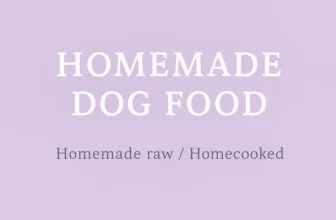
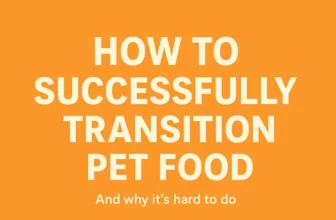
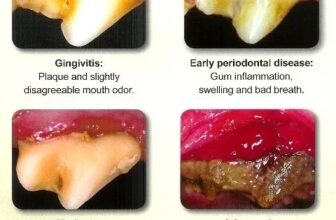
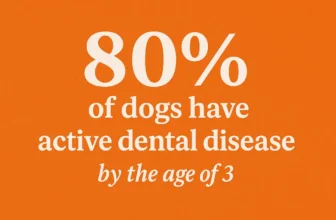
I currently only feed Lifewise dry food and my dog is doing really well on it. I want to introduce him to wet food as well and he really seems to like Prime100 slow cooked food and I like the ingredients. So I am planning on giving him ½ Lifewise and ½ Prime100 for dinner. However when I looked at the analysis, it says that there is only 8% protein in there. Shouldn’t dog food be at least 20% protein? I do give him air dried (liver) treats during the day too and he gets one chicken foot a day, but I am worried he won’t be getting enough protein due to the wet food.
Hi Ines, wet foods are labelled “wet weight” and dry foods “dry weight” (i.e. without moisture). 8% protein in a wet food with around 65% moisture would convert roughly to 23% protein dry matter – so comparable. Also, in dry foods there’s a much higher carbohydrate content rather than moisture, which isn’t ideal for your dog as a primarily carnivorous animal.
I tried my dog on Lyka cause she is incredibly fussy, she hated it, wouldn’t eat any of the 6 I tried on her. She currently lives on raw lamb, beef and cooked chicken pieces, but I’d like to try a home made slow cooked something for her, any recipes you could recommend?
Hi Vyonne, that’s interesting to hear – and useful feedback. Were you transitioning from dry to Lyka, or from raw?
I’m not the best source for recipes, but slow cooked meats and organs as the main ingredients is a great start. Let’s say to the 80/10/10 rule of 80% meat, 10% organs (including 5% liver), then taking the remaining 10% bone which you can’t cook, but could substitute with bone broth as a great start, and tough meat-based chews for dental cleaning (and satisfaction!).
With that as a base, you can add in healthy veggies, healthy oils, eggs, superfoods – whatever you like to boost nutrition!
Hi I’d love to make some slow cooked and balanced dog food at home. Can you recommend any DIY recipes?
Hi Sophie, I don’t have any recipes, and rather than add some I decided to write my thoughts (or a guide if you will) to making dog food at home – https://www.petfoodreviews.com.au/homemade-dog-food-homecooked/
Hopefully that has some good pointers?
I searched Google to see what recipes cropped up, and realised they’re worryingly unbalanced with most being rice, veg, and mince, which won’t contain most nutrients sourced from organ meats and bone (which AAFCO compliant pet foods add as a supplement vitamin/mineral mix).